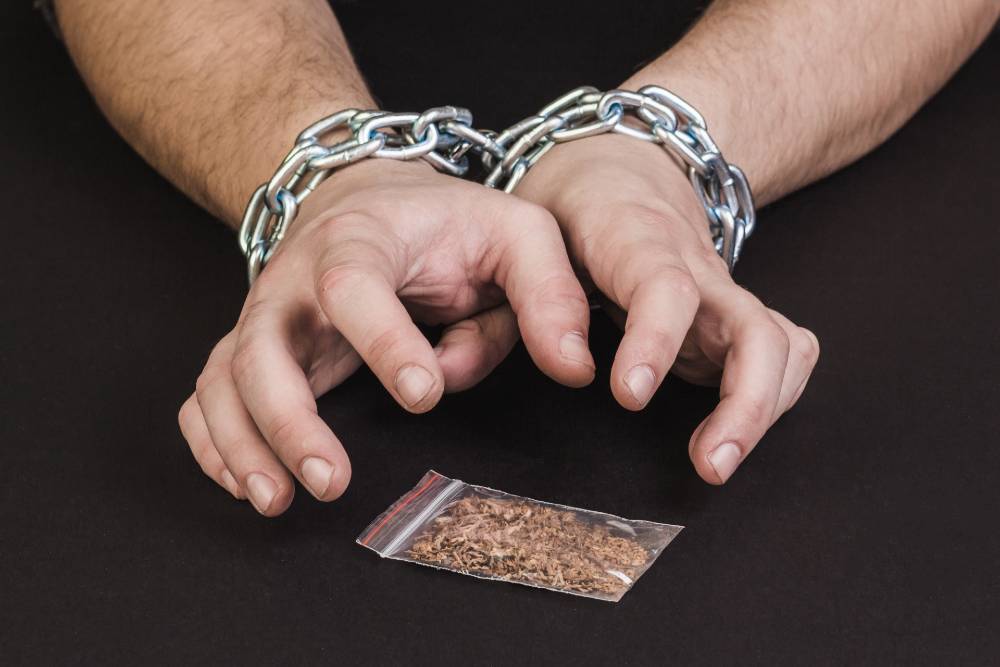 On average, roughly 1.5 million people are arrested for drug-related crimes every year. These crimes have become a serious issue in the United States, and any offense in which drugs are involved is taken very seriously by the U.S. judicial system.
On average, roughly 1.5 million people are arrested for drug-related crimes every year. These crimes have become a serious issue in the United States, and any offense in which drugs are involved is taken very seriously by the U.S. judicial system.
Offenses that are related to drugs do not always involve the production, possession or selling of drugs; in many cases, drugs are a secondary issue to another offense. In fact, according to numbers from the U.S. Department of Justice, a large percentage of crimes are committed by people who were on drugs when they committed the crime.
Drug Use is Not an Excuse
More often than not, drugs affect the cognitive ability and impulse control of the individuals who take them, and because of that some people behave abnormally while under the influence of certain drugs, and may behave in ways they otherwise wouldn’t.
Despite the fact that the criminal behavior may have been out of character for the person who committed the act, that person will still face possible punishment, intoxication will not usually be accepted as an excuse. Most states do not allow offenders to use intoxication as defense, and some state laws actually increase punishment for offenses when drugs are involved.
A crime committed by someone high on drugs is typically not considered the same as a crime committed by an individual with a natural mental disease. Offenses involving drugs are taken seriously and the offenders are punished harshly.
Crimes Related to Drug Distribution
Selling drugs can be a very lucrative, though highly illegal and extremely dangerous way to make money. That makes it appealing to some people, including not only small time local criminals selling drugs in their neighborhoods, but also advanced and organized criminals. There are numerous instances of corporations and commercial operations using legitimate businesses as a front for drug trafficking. But these eventually get discovered, and the punishments for such crimes can be quite severe.
The actual penalties for offenses related to drug distribution depend on a number of factors. The type of drug is always a factor, because some drugs are considered to be more dangerous and insidious than others. The quantity of drugs is also a factor, with larger distribution systems generally getting harsher penalties.
Many punishments for drug related crimes are based on a federal drug schedule that outlines the minimum and maximum penalties allowed under federal law.
Drug Rehabilitation
U.S. criminal law sometimes attempts to provide rehabilitation programs for individuals who commit offenses related to drugs. Most individuals who are convicted of first time drug offenses spend between 1 to 3 years in jail before they are released. While spending that time in jail, and in some cases even after time served, some individuals may be required to take part in rehabilitation programs, drug-related therapy, support groups and mentoring programs.
While the system does have a great number of problems, there is an ever increasing understanding that many drug offenses should be treated as health issues, not criminal offenses.
Contact Our Boulder Drug Charge Defense Lawyers
 If you have been charged with any drug crime, or if you believe that you will be charged, speak with Boulder drug crime defense attorney Steven Louth immediately, if possible before you speak to police. He can ensure that your rights are protected, and work to have charges against you dismissed. If your case does go to trial, Steven Louth will fight hard to win an acquittal for you or, in the event of a conviction, to get the most lenient penalty possible.
If you have been charged with any drug crime, or if you believe that you will be charged, speak with Boulder drug crime defense attorney Steven Louth immediately, if possible before you speak to police. He can ensure that your rights are protected, and work to have charges against you dismissed. If your case does go to trial, Steven Louth will fight hard to win an acquittal for you or, in the event of a conviction, to get the most lenient penalty possible.
Steven has a history of successful defense of people charged with drug crimes, and brings over two decades of experience to every case that he takes on. For more information and a FREE CASE EVALUATION contact Steven Louth today at (303)442-2297, or by filling out the contact form on this page.
